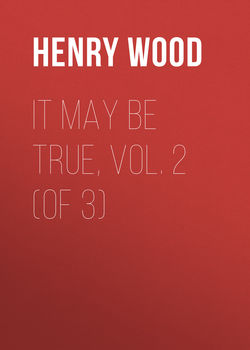Читать книгу It May Be True, Vol. 2 (of 3) - Henry Wood - Страница 3
CHAPTER III.
THE LETTER
Оглавление"They sin who tell us love can die!
With life all other passions fly—
All others are but vanity.
In heaven ambition cannot dwell,
Nor avarice in the vaults of hell.
Earthly these passions, as of earth—
They perish where they draw their birth.
But love is indestructible!
Its holy flame for ever burneth—
From heaven it came, to heaven returneth."
Southey.
Against the mantle-piece in the morning-room leant Mrs. Linchmore; one hand supported her head, the other hung listlessly by her side, while in the long taper fingers she clasped an open letter. A tiny foot peeped from under the folds of her dress, and rested on the edge of the fender; the fire burnt clear and bright, and lent a slight glow to her cheeks, which were generally pale.
She looked very beautiful as she stood there; her graceful figure showed itself to the best advantage, and her long dark lashes swept her cheek, as she looked thoughtfully on the ground.
Mrs. Linchmore was not a happy woman; she had, as I have said, married for money, and when too late, found out her mistake, and that money without love is nothing worth.
When scarcely seventeen, she had loved with all the fervour and truth of a young heart's first love; her love was returned, but her lover was poor, they must wait for better times; so he went abroad to India, full of hope, and firm in the faith of her to whom he was betrothed; to win honour, fame, glory, and promotion; and with the latter, money wherewith to win as his wife her whom he so dearly loved.
Scarcely three years had passed slowly away, when Mr. Linchmore wooed the beautiful Isabella for his bride; he was young and handsome, and unlike her former lover, rich. Did she forget him to whom her young love was pledged? No, she still thought of him, love for him still filled her heart, yet she smothered it, and became the wife of the wealthy Mr. Linchmore, with scarcely a thought as to the suffering she was causing another, or remorse at her broken faith and perjured vows.
Shortly after her marriage, she heard of her young lover's hasty return, and what a return! Not the return he had so often pictured to her in the days gone by, never to be lived over again; but he came as a sorrowful, broken-hearted man, mourning the loss of one who was no longer worthy of his love, one for whom he had been willing to sacrifice so much, even the wishes of those nearest and dearest to him—his father and mother, whose only child he was.
His death soon after nearly broke his mother's heart; some said it was occasioned from the effects of a fever, caught in an unhealthy climate, but Mrs. Linchmore, his early love, dared not question her own heart when she heard of it, but gazed around, and shuddered at the magnificence of the home for which he had been sacrificed. Then remorse and anguish, bitter anguish, must have been busy within her, but she showed it not; outwardly, she was the same, or it might be a little prouder, or more stately in her walk, more over-bearing to her servants, with all of the proud woman, and none of the girl about her.
The envy of many. Ah! could they but have seen the wretchedness of her heart, the hollowness of her smiles, would they have envied her? Would they not rather have been thankful and contented with their lot, and changed their envy into pity?
This was what she dreaded. Their pity! No, anything but that. To be hated, feared, disliked, dreaded, all—all anything but pitied. To none would she be other than the rich, the happy Mrs. Linchmore; and so she appeared to some, nay, to all. Henceforth her heart was dead and cold, no love must,—could enter there again.
She became a flirt, and a selfish woman, without one particle of sympathy, and scarcely any love for her husband. How dissimilar they were—in ideas, thoughts, feelings, tastes—in everything. She took no trouble to conceal from him how little she cared for him; he who loved her so intensely—so truthfully.
In the first early days of their married life he strove to win her affection by every little act of kindness, or devotion that his love prompted; but all in vain;—he failed. All his deeds of kindness all his love elicited no answering token of regard, no look of love from her; she was ever the same—cold, silent, distant; no sweet smile on her face to welcome him home, no brightening of the eye at his approach, no fond pressure of the hand: truly she loved him not, yet no word of unkindness or reproach ever crossed his lips, even when she turned away from his encircling arm as he stooped to kiss his first-born, no word escaped him—but his look,—she remembered that long after; it haunted her dreams for many a long night.
